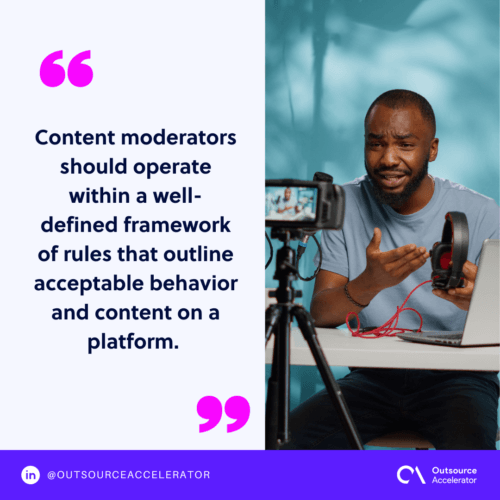Content moderation practices to protect users in the digital age

The floodgates of user-generated content never seem to close. Information flows freely and rapidly, and ensuring a safe and welcoming online environment has become more critical than ever.
The Internet, once a symbol of boundless opportunity and free expression, has also brought with it the challenges of harmful content and misinformation.
As digital spaces grow, so do the risks and challenges associated with unfiltered content. It’s within this backdrop that the role of content moderation becomes a critical shield.
This article looks at several content moderation practices that are necessary to protect users and maintain a healthy digital environment for your brand.
5 best practices for content moderators
Employing best practices for content moderation is key to managing online interactions and fostering a positive digital space.
Here are five of the best practices you can utilize for your content:
1. Clear community guidelines and policies
Content moderators should operate within a well-defined framework of rules that outline acceptable behavior and content on a platform.
Clear guidelines help ensure consistency in moderation decisions and provide users with a transparent understanding of what is allowed. These guidelines should cover a wide range of topics, including hate speech, harassment, graphic content, and misinformation.

2. Regular training and updates
The digital landscape is constantly changing its trends, slang, and cultural shifts. Regular training ensures that outsourced moderators stay informed about the latest developments and can apply guidelines accordingly.
Provide ongoing training sessions, workshops, and resources that cover the latest moderation tools, platform policies, and cultural sensitivity issues.
3. Consistent rule enforcement
Content moderation requires the consistent application of guidelines across all types of content and users. Consistency ensures fairness and upholds the integrity of the platform.
Develop standardized procedures for handling different types of content and ensure that all moderators are trained to apply these procedures uniformly. Regularly review and adjust enforcement policies to maintain consistency.
4. Transparency and accountability
Transparency in content moderation decisions fosters trust with the user community. Moderators should document their decisions and be prepared to explain them if questioned.
Outline a clear process for logging moderation actions and handling appeals. Users should be able to understand why certain content was removed or flagged.
5. Use of advanced technology
Leveraging automation tools can help streamline the process, especially for large scale platforms.
However, human oversight and intervention are vital to ensure that automated decisions align with the platform’s content guidelines. Train moderators to use these tools as supplements while they focus on more nuanced cases.
Benefits of effective content moderation
Content moderation offers several key benefits that contribute to the safety, integrity, and overall quality of online platforms.
Here are some of the main advantages:
User safety and protection
Content moderation protects users by preventing the spread of harmful, abusive, or inappropriate content. Moderators can identify and remove content that is discriminatory, distressing, or offensive, creating a safer online community for interaction.
Brand reputation and credibility
A platform known for high-quality content and respectful interactions enhances its reputation and credibility.
This can attract more users, advertisers, and business partners, contributing to the platform’s growth and success.
Legal compliance
Online platforms that don’t moderate their content effectively may face legal consequences for hosting illegal or harmful material. Moderation helps comply with regulations, such as those related to child protection, hate speech, and data privacy.
Enhanced user experience
Clean and high-quality content improves the user experience on digital platforms.
Moderation helps ensure that interactions remain positive and constructive, making the platform more enjoyable and engaging for users.
Prevention of misinformation
Content moderation plays a critical role in ensuring accuracy and credibility of information online. Misinformation, especially on social media, can lead to public panic and harmful consequences.
By removing fake news, propaganda, or misleading content, moderators help promote informed and reliable discussion.

Risk mitigation
Unmoderated content poses risks of cyberbullying, scams, phishing attacks, or exposure to inappropriate material for vulnerable audiences.
Content moderation acts as a preventive measure to reduce these risks and safeguard users from possible harm.
How OP360’s outsourced content moderation can help
As a leading provider of outsourced content moderation services, OP360 is dedicated to helping online platforms ensure a positive user experience.
Its team of experienced content moderators is trained in industry best practices and is committed to upholding the highest quality standards.
OP360 understands the complexities of balancing freedom of expression with user safety and brings a deep knowledge of cultural sensitivities and regional nuances to its work.
By partnering with OP360, you can focus on growing your business while it handles the intricacies of content moderation. Let OP360 help you create a secure online experience for your users and foster a vibrant community!
Choose OP360 for your content moderation needs and experience the peace of mind that comes with expert, reliable service.






 Independent
Independent




